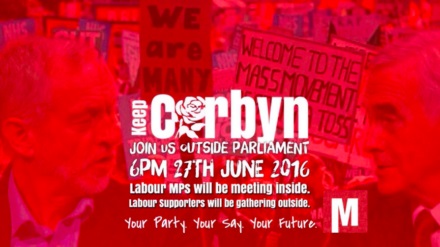Labour MPs having a hissy fit over their leadership is nothing new. The 18 Labour MPs who have resigned from the Shadow Cabinet in the last 48 hours are following in the footsteps of those who have done it all before.
In 1981, the “gang of four” – two sitting and two former Labour MPs – left the Party because they thought some policies passed at a membership conference were too left wing. (Ironically, the policies party members adopted were unilateral nuclear disarmament and withdrawal from the EU.)
They went on to set up the Social Democratic Party (SDP). More Labour MPs joined them, and the SDP formed an electoral alliance with the Liberal Party. The two split the Labour vote in the 1983 and 1987 General Elections, subjecting the country to a prolonged Tory Government – initially under Margaret Thatcher.
That is the kind of damage which just four individuals who think they are bigger than their Party and who treat politics as a personal career move rather than a duty to represent their constituents. However, in the fullness of time the parties merged to form the Liberal-Democrats (a rump of the Liberal Party refused to join and just carried on as the Liberal Party).
The merged Party never made an electoral breakthrough in Westminster. To its great surprise, it found itself holding the balance of power in 2010 – and opted to form a Coalition Government with the Tories. Reduced to eight MPs at the 2015 election, as its supporters punished it for letting the Tories to get their hands back on the reins of power, its decision to enjoy a brief spell in government has probably pushed it off the electoral map for decades.
The parallels with today are striking. Jeremy Corbyn was elected Labour Leader with a huge mandate from Labour Party members and supporters. Why did the MPs not embrace the opportunity to change direction and start the job of getting back into government?
First, the longer serving MPs were selected during the Blair years. These people have been told so often that Labour needs to be more like the Tories to win general elections that they actually believe this. They have been told to hate the left for so long that they actually do. They have been told that Labour’s long time out of office in the 1980s and 1990s was the fault of the left rather than the SDP – and they believe that too. They have no imagination or political skill to look further than these mantras by which they have lived – and lost general elections.
Second, the Thatcher years and the Blair years have spent so long demonising left politics that many MPs would rather lose elections than take office on the basis of left wing policies. It’s no good pointing out to them that the tired old leadership challengers who were defeated in the last contest could not win a General Election – because they don’t want to win any old General Election and only want to win on their own terms. They don’t want to see alternatives or intelligent debate.
Why have so many of the Shadow Cabinet chosen to move now? Most of them, like lemmings, are just rushing to follow the leader. The truth is that the Corbyn challengers have been waiting for their moment. They had a coup planned for May – which they wanted to launch on the back of Labour losing hundreds of Council seats. It didn’t, so they couldn’t make their move then.
Now, however, the Tory Party is split and Cameron has resigned. There is a good chance Boris Johnson will be Prime Minister by October – and he would run a very right wing Tory ship. In those circumstances, those Labour MPs who were prepared to wait to return to office can see an opportunity. If they can hold on to their traditional Labour support, such as it is, while appearing “home counties” enough to appeal to those Torries who don’t back Boris, they could come through the middle and return to government. For that, they need to have middle of the road policies – and a middle of the road Leader, which Corbyn will never be.
Unfortunately, that scenario is not likely to happen in real life. Much more likely, if the axers get their way, is that the labour movement may end up more split than the Tories and as electorally irrelevant as the Lib-Dems.
Corbyn originally assembled a broadly based and inclusive Shadow Cabinet. Now that most of them has resigned, he has replaced them by backbench MPs who are more loyal to the Party.
To his great and eternal credit, Jeremy Corbyn is hanging on – totally certain that the mandate of 200,000+ supporters is greater than the discontent of 200- MPs – but this is a high stakes game.
Feel the hand of history. Parliament Square, 6pm, tonight.
[Adverts]
 East London News A Force for the community…
East London News A Force for the community…




